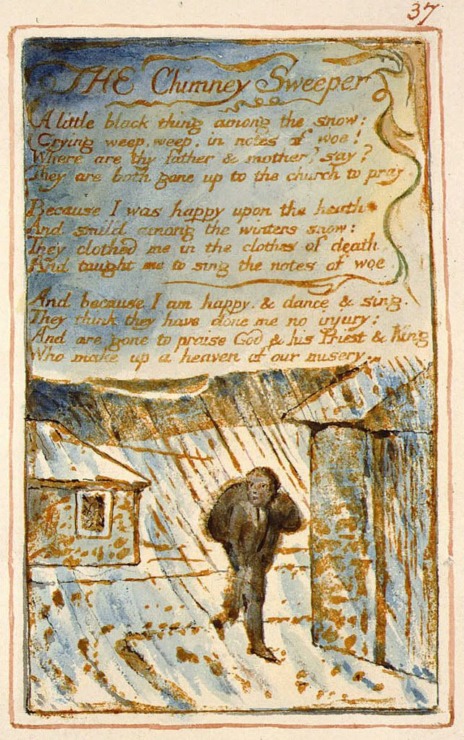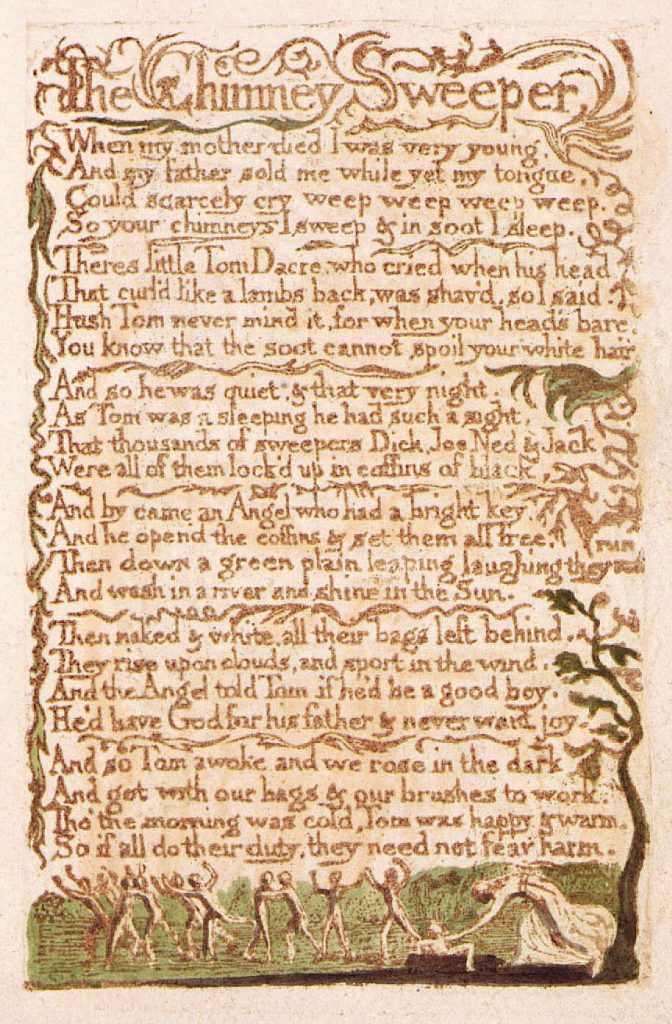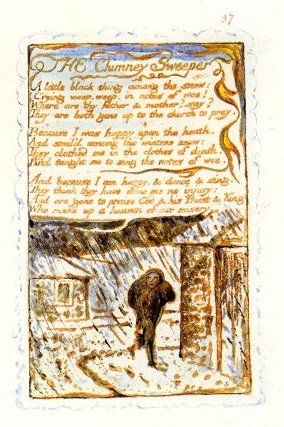The Chimney Sweeper By William Blake Sparknotes
The Praise of Chimney-Sweepers by Charles Lamb.
The chimney sweeper by william blake sparknotes. The poem is in the first person about a very young chimney sweeper who exposes the evils of chimney sweeping as a part of the cruelties created by the sudden increase in wealth. Because I was happy upon the heath And smiled among the winters snow They clothed me in the clothes of death And taught me to sing the notes of woe. When my mother died I was very young And my father sold me while yet my tongue Could scarcely cry Weep.
Weep in notes of woe. In the dark streets of London the exploitation of children is the focus of his piece. Review the Poetry Essay Grading Rubric to see how your submission will be graded.
The Chimney Sweeper present in both Songs of Innocence and Songs of Experience are heart wrenching pieces of poetry written by Blake to shed light upon the oppression that the underage children went through just so that the greedy so-called upper class members of the society and their money-hungry parents who sold them off could exploit their innocence and labor to suit their needs. The chimney sweeper cries notes of woe a contrast to scarcely crying weep. Songs of Innocence The Chimney-Sweeper.
Yet he bears no ill will accepting without question both his. It led to urbanisation and thus slums child. Theres little Tom Dacre who cried when his head That curled like a lambs back was shaved.
The chimney sweeper symbolizes the plight of Englands children chimney sweeper was a horrible job done by children because they were small enough to fit in the chimney. He was good if eer a good. The Chimney Sweeper a poem of six quatrains accompanied by William Blakes illustration appeared in Songs of Innocence in 1789 the year of.
William Blakes The Chimney Sweeper is a two-part poem about a few chimney sweeps in late eighteenth-century England. The Chimney Sweeper is a poem by William Blake published in his 1789 collection Songs of Innocence. Popularity of The Chimney Sweeper.
Weep So your chimneys I sweep in soot I sleep. This poem was written by William Blake a popular English poet. The two perspectives reveal how innocence and experience played a role in each viewpoint.
William Blakes somber piece The Chimney Sweeper revealed the underlying injustices of the 18th century. Charles Lamb likes to meet a chimneysweeper but he is more interested in the young professionals than the grownup ones. When my mother died I was very young And my father sold me while yet my tongue.
Weep So your chimneys I sweep in soot I sleep. The poem is told from the perspective of a young chimney sweep a boy who has been sold into labor by his father. The Mariachis - Poetry Discussions.
One of them was sold by his father after the death of his mother. The poem comprises the agony of children who were forced to live a miserable life. The Chimney Sweeper by William Blake.
Weep So your chimneys I sweep and in soot I sleep. The children had to survive and earn their livelihood by sweeping chimney at a very young age during the time of William Blake. The Chimney Sweeper Summary from Songs of Innocence by William Blake - The poem The Chimney Sweeper from Songs of Innocence is about two children who are forced to work as sweepers in a Chimney.
Weep The first stanza contains the following contrast. Could scarcely cry weep. When my mother died I was very young.
The poem was used as a broadsheet or propaganda against the evil of Chimney Sweeping. Where are thy father and mother. The Chimney Sweeper is a popular poem on account of its theme of poverty and the life of the working children.
Because of their small size children around the ages of four and five were sold to companies to clean out chimneys. Image result for praise of chimney sweepers summary. The Chimney Sweeper Analysis In these twenty-four lines of William Blakes poem The Chimney Sweeper a young man is recounting Scott Hughes Mit Cv to the narrative of his miserable life just as the dismal stories of other stacks sweeper young men.
Could scarcely cry weep. The Chimney Sweeper - William Blake Showing 1-13 of 13. Say They are both gone up to the church to pray.
A little black thing among the snow Crying. When my mother died I was very young And my father sold me while yet my tongue. The chimney sweeper is robbed of everything that should be the accompaniment of innocence.
The poem The Chimney Sweeper from Songs of Experience by William Blake brings into light the animal-like condition of children during the 17th and 18th-century era. Songs of Experience The Chimney-Sweeper. It was first published in 1789.


















